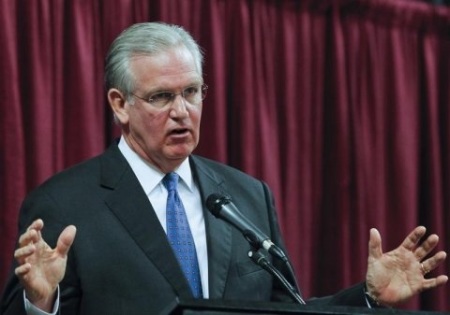Missouri Governor Vetoes, Blasts 3-Day Abortion Waiting Period Bill as 'Extreme and Disrespectful'
Missouri Governor Jay Nixon vetoed a bill on Tuesday which would have mandated a three-day waiting period for women seeking abortions.

Missouri already has a 24-hour waiting period. Nixon blasted the bill as serving "no demonstrable purpose other than to create emotional and financial hardships for women who have undoubtedly already spent considerable time wrestling with perhaps the most difficult decision they may ever have to make."
Nixon also labeled House Bill 130 as "extreme and disrespectful" and alleged that it would "unnecessarily prolong the suffering of rape and incest victims and jeopardize the health and wellbeing of women."
"By failing to include an exception for rape and incest, House Bill 1307 demonstrates a callous disregard for women who find themselves in horrific circumstances and would make Missouri one of just two states in the nation to take such an extreme step," he continued.
Nixon, who is currently in the middle of his second term, added that even if the bill had included provisions for victims of rape or incest, he still would have vetoed the bill.
Utah and South Dakota are among the two other states which currently mandate a three-day waiting period. Only Utah's makes an exemption for victims of rape, incest or for girls 13 or under.
Although Nixon is a Democrat, Republicans control Missouri's legislature which passed the law largely along party lines.
Sen. David Sater (R-Cassville) said that he would push for an override of the veto in September, which would require two-thirds from both chambers.
Abortion "is an irreversible and permanent decision, and taking the time to think about the consequences is not unreasonable or a burden," Sater said in a statement.
Sater, the bill's sponsor, also took issue with the idea of adding exemptions for victims of rape or incest.
"Should the unborn child of a rape victim have a different life or be less important than another unborn child?" he asked, as reported by The Kansas City Star.
Over the course of his tenure, Nixon has allowed bills restricting abortion to become law, without his signature. According to the St. Louis Post-Dispatch, the laws placed additional restrictions on the use of abortion-inducing drugs, restricted abortions after 20 weeks of pregnancy, and mandated that abortion clinics offer women the chance to view an ultrasound and listen to the heartbeat of the fetus. Clinics must also provide a state-produced brochure proclaiming that "the life of each human being begins at conception. Abortion will terminate the life of a separate, unique, living human being."
Within the state, the number of abortions has dropped by almost 50 percent in the past two decades plus, from 17,947 in 1990 to 9,027 in 2012, according to state figures.





















